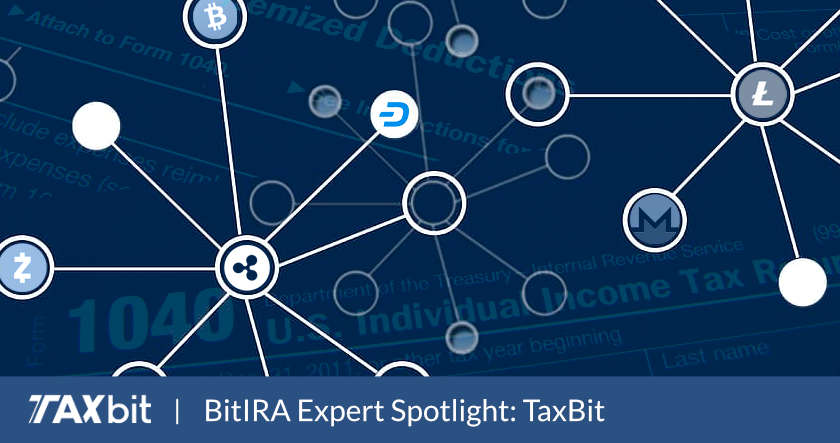Crypto Tax Insights from Co-Founder Justin Woodward
TaxBit helps you automatically sync crypto transactions from exchanges so that you can file your taxes accurately, even as regulations evolve to reflect an increasingly sophisticated cryptocurrency landscape. TaxBit has also been working hard to clarify the precise forms and documentation taxpayers are required to submit in order to comply with the IRS’ guidelines. Co-founder Justin Woodward recently sat down with BitIRA to share how he got drawn to crypto as well as to answer some questions submitted by BitIRA customers.
BitIRA: When did you first become interested in cryptocurrency and what made you trust in its future?
Justin: I was first exposed to cryptocurrency in 2014 when I had a large Fortune 500 client ask me about the feasibility of it accepting cryptocurrency on its platform in exchange for goods and services. I dove into the regulations on privacy, security, filings, but the biggest hangup at this time was ultimately tracking and reporting the tax consequences of these transactions. This led to working on several cryptocurrency tax projects where I encountered clients with similar issues and ultimately developing a solution to automate the cryptocurrency tax complexities.
BitIRA: What are some of the biggest public misconceptions that you see around cryptocurrency?
Justin: The biggest misconception I hear is that the IRS hasn’t been clear on the tax implications of trading virtual assets and therefore they do not need to file anything. The IRS has heavily analogized their cryptocurrency tax guidance to other capital assets such as stocks and equities. Although there are sometimes very unique tax situations that are specific to virtual currencies, the existing tax guidance is clear in the vast majority of situations.
BitIRA: In light of all of that experience you have with both the public and the stakeholders in the crypto space, what do you anticipate as being a regulatory need in crypto right now?
Justin: There are many issues that are currently being addressed through legislative proposals and/or administrative guidance. One of the many issues I’m interested in is developments in relation to unified international reporting. The Organisation for Economic Cooperation and Development (OECD) is currently in the process of clarifying regulations regarding Common Reporting Standards. These regulations should help unify the tax treatment of cryptocurrencies across member countries.
BitIRA: Taking a step back, are there any particular issues or problems you’d like to see crypto and/or blockchain tackle next?
Justin: I am very excited about projects that tokenize existing assets. This is particularly exciting in relation to real estate. I love the prospect of being able to own a token that represents a percentage of ownership in real estate or other assets. Rather than buying an entire house in New York I can purchase a small percentage of ownership in ten houses in various locations spread across the country.
– – – – – – – – –
User-submitted questions
(Disclaimer: This article is for educational purposes only. Please consult with a certified tax professional to review your particular situation and receive advice.)
#1 – Hi, my sister wants to send me a huge sum of money made from her crypto tradings. My sister is not based in US and she didn’t use a US account to trade but I’m based in US. She’d like me to put this money in my savings account. Is there any tax implications?
There typically is not a tax consequence to receiving a gift. (There may be certain tax consequences for the giver depending on residency, whether the gift rises above certain thresholds, etc.). However, there will be tax consequences when selling the crypto gift. The rules are a little nuanced and are dependent on a few variables. (See TaxBit’s and The Giving Block’s Crypto Tax Gift Guide for more detailed information).
#2 – Do I have to pay taxes on a $10 gain… Is there a certain limit where tax is 0%?
All capital gains and losses should be reported on an IRS 8949. There are no minimum thresholds that trigger an exemption. However, if you had capital losses then you may receive an increased tax refund by reporting your cryptocurrency taxes. The tax rate on capital gains is dependent on your income bracket. For example, if you are married and make less than $80,000 a year then you will pay 0% on capital gains.
#3 – If I transfer my cryptocurrency by downloading it to a prepaid debit card (as opposed to exchanging it for fiat currency), is that a taxable event either at the time of download or expenditure?
It depends on the service you are using and the mechanics of the transaction. Some services treat loading the debit card as a taxable disposition because the card converts crypto-to-fiat upon the loading event. Other services only convert the crypto-to-fiat upon expenditure. TaxBit is working with its partners to optimize taxes on cryptocurrency expenditures using crypto debit and credit cards.






